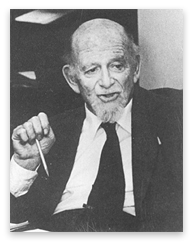Liberty Matters
Lachmann and Mises

"And it was Mises with whom he always claimed to have the greatest philosophical affinity. It was Mises's subjective approach to means and ends (shared with Weber) and his view of the market as a process that Lachmann saw as the most fruitful avenues for advancement."
Bill Tulloh raises some really critical points in his comments. If only there were time to take them all up. But in the above quote my attention is riveted on the word "affinity."
How did Lachmann see his relationship with Mises? I would say it was much like his appreciation of Shackle, Hicks, and Keynes, but in the other direction. Where he liked these thinkers for their questions, as Tulloh notes—for their relentless interrogation of the inconsistencies of individual plans--he appreciated Mises for his relentless application of purposefulness, of the ends/means relationship, to economic processes.
Indeed, besides Mises, few other economists have made more of this concept purposefulness. It is no wonder, then, that Lachmann would see the natural affinity of Mises with Weber, even where the former would not!
Throughout his writings Mises remained rigorously logical in his derivations from the category of purposeful human action, so much so that he ran his praxeological categories straight through his catallactic ones. It is why he could not ultimately accept the hermeneutical definition of understanding.
With but slight modification of Weber's verstehen, however, Lachmann found Mises's theoretical articulations to be an analytically target-rich environment!
Copyright and Fair Use Statement
“Liberty Matters” is the copyright of Liberty Fund, Inc. This material is put on line to further the educational goals of Liberty Fund, Inc. These essays and responses may be quoted and otherwise used under “fair use” provisions for educational and academic purposes. To reprint these essays in course booklets requires the prior permission of Liberty Fund, Inc. Please contact oll@libertyfund.org if you have any questions.